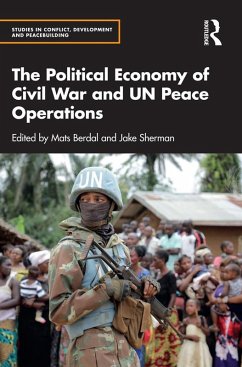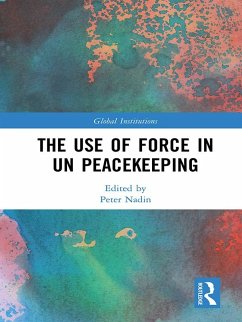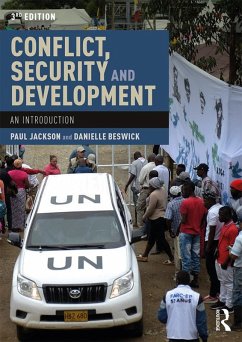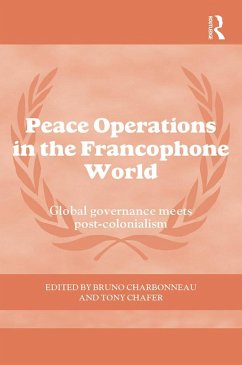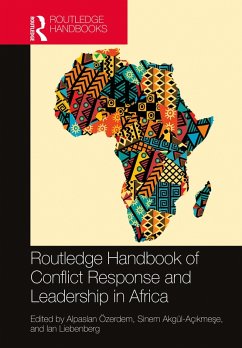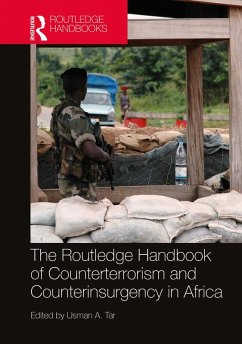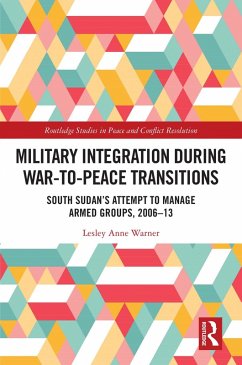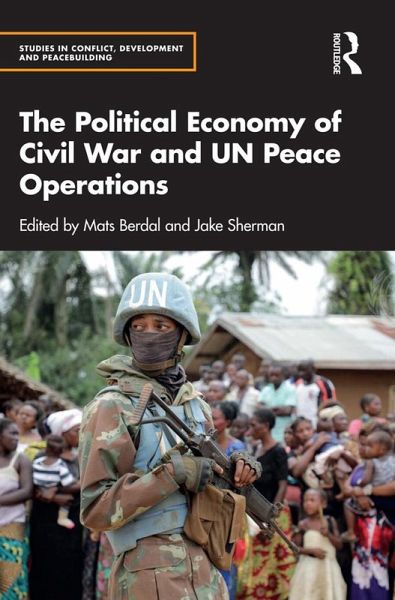
The Political Economy of Civil War and UN Peace Operations (eBook, PDF)
Versandkostenfrei!
Sofort per Download lieferbar
36,95 €
inkl. MwSt.
Weitere Ausgaben:

PAYBACK Punkte
18 °P sammeln!
This book examines the operational and political challenges facing UN peace operations deployed in countries where civil war and protracted violence have given rise to the complex and distinctive political economies of conflict.The volume explores the nature and impact of such political economies - informal systems of power and influence formed by the interaction of local, national, and region-wide war economies with the political agendas of conflict actors - on the course of UN peace operations. It focuses in detail on the UN's long-running peace operations in the Democratic Republic of Congo...
This book examines the operational and political challenges facing UN peace operations deployed in countries where civil war and protracted violence have given rise to the complex and distinctive political economies of conflict.
The volume explores the nature and impact of such political economies - informal systems of power and influence formed by the interaction of local, national, and region-wide war economies with the political agendas of conflict actors - on the course of UN peace operations. It focuses in detail on the UN's long-running peace operations in the Democratic Republic of Congo, South Sudan, Afghanistan, Sierra Leone, Mali, and Somalia. The book is centrally concerned with the interaction of UN missions with the power structures and local conflict dynamics that shape individual mission settings, and the challenges these pose for mediation, protection of civilians, and other tasks. It also offers a critical assessment of the various ways in which the UN 'system', from its headquarters in New York to the field, has confronted the policy challenges posed by political economies of conflict-affected states, societies, and regions. It advances a pragmatic set of policy recommendations aimed at improving the UN's ability to confront predatory and exploitative war economies. At the same time, the volume makes it clear that political and institutional obstacles to more effective UN action are certain to remain profound and are unlikely ever to be fully overcome let alone eradicated. Despite making some progress since the 1990s to better understand the political economy of civil wars, the UN has struggled with how to tackle informal networks of power and their consequences for efforts to end wars.
The book will be of special interest to students of war and conflict studies, statebuilding, political economy of conflict, UN interventionism and peacebuilding, and IR/Security in general.
The volume explores the nature and impact of such political economies - informal systems of power and influence formed by the interaction of local, national, and region-wide war economies with the political agendas of conflict actors - on the course of UN peace operations. It focuses in detail on the UN's long-running peace operations in the Democratic Republic of Congo, South Sudan, Afghanistan, Sierra Leone, Mali, and Somalia. The book is centrally concerned with the interaction of UN missions with the power structures and local conflict dynamics that shape individual mission settings, and the challenges these pose for mediation, protection of civilians, and other tasks. It also offers a critical assessment of the various ways in which the UN 'system', from its headquarters in New York to the field, has confronted the policy challenges posed by political economies of conflict-affected states, societies, and regions. It advances a pragmatic set of policy recommendations aimed at improving the UN's ability to confront predatory and exploitative war economies. At the same time, the volume makes it clear that political and institutional obstacles to more effective UN action are certain to remain profound and are unlikely ever to be fully overcome let alone eradicated. Despite making some progress since the 1990s to better understand the political economy of civil wars, the UN has struggled with how to tackle informal networks of power and their consequences for efforts to end wars.
The book will be of special interest to students of war and conflict studies, statebuilding, political economy of conflict, UN interventionism and peacebuilding, and IR/Security in general.
Dieser Download kann aus rechtlichen Gründen nur mit Rechnungsadresse in A, B, BG, CY, CZ, D, DK, EW, E, FIN, F, GR, HR, H, IRL, I, LT, L, LR, M, NL, PL, P, R, S, SLO, SK ausgeliefert werden.




